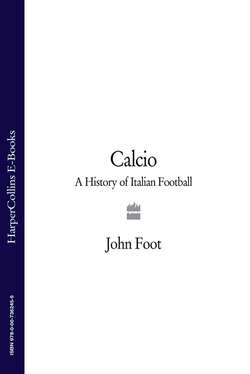Читать книгу Calcio: A History of Italian Football - John Foot - Страница 49
Fiorentina and Juventus. Last day of the championship. 16 May 1982
ОглавлениеAfter an emotional season, Fiorentina and Juventus went into the last game level on points. Fiorentina had not won the scudetto since 1969 while Juventus were the title-holders. Most commentators believed that the championship would go to a playoff for only the second time in its history – and a stadium was already lined up for the one-off match.27 Fiorentina fans had celebrated long into the night after drawing level in the penultimate game. Yet, their team had the most difficult task, away to Cagliari, who needed points to avoid relegation. Lowly Catanzaro, a Calabrian team from the deep south of Italy, who were to play Juve at home, were safe.
Juventus were greeted by 30,000 hostile fans on their arrival in Catanzaro. The home-town ground’s total capacity was only 25,500. Paolo Rossi, the great centre-forward who had just completed a ban after becoming involved in a betting scam in 1980, was pushed around to shouts of ‘crook, crook’ and ‘prison trash’. Only a tiny number of Juve fans made the 28-hour journey from Turin while Fiorentina booked five charter flights to Sardinia, and at least 1,000 fans, including the Mayor, made the long round trip.
The first controversial incident took place after 35 minutes, with both games deadlocked at 0–0. A Catanzaro forward appeared to be brought down by a Juve defender. Referee Pieri gave nothing. With fifteen minutes to go, a playoff seemed inevitable. Nobody had scored in either game. Then, Pieri did give a penalty, this time to Juventus, for handball. Liam Brady stepped up to take it, knowing that he had already been sold by the club to make way for Michel Platini. Brady, cool as ever, clipped the ball left, the goalie went right: 1–0. Meanwhile, at Cagliari, Fiorentina couldn’t score. In the second half, their striker Bertoni went up with the Cagliari goalkeeper; the ball fell to Graziani, who scored. But referee Maurizio Mattei disallowed the goal for a foul on the keeper. Dramatically, Juve had won the championship with only fifteen minutes of the season to go. It was their twentieth scudetto, which gave them their second gold star.
Fiorentina fans have always seen these events as evidence of robbery. Their captain Giancarlo Antognoni made no secret of his views after the game; ‘they have stolen our championship’. Juventus, he noted, were the only team in the league not to have had a penalty given against them all season. Fiorentina’s fans have never forgotten 1982’s events, and subsequent matches with Juve have often descended into violence on and off the pitch. In May 2003, 21 years on, a banner was unfurled by the Fiorentina fans which read Never Forget: Mattei. It is claimed that the anti-Juventus slogan ‘we would rather be second than thieves’ was born in the wake of May 1982. Mattei, like Bergamo, went on to become a ‘designator’, one of the most powerful positions in the game. Juventus’s victory had done his career no harm.
But what really happened on the pitch, beyond the myth and legend that has emerged since? According to Gianni Brera and other journalists at the game, the Juve penalty was a penalty (‘very clearly’), and the Fiorentina goal should have been disallowed. That leaves the possible penalty in favour of Catanzaro, in the first half. Brera vacillated on this (he was a great fan of Trapattoni, Juve’s manager) and ended up with this: ‘if you put yourself in Pieri’s shoes – having to decide the course of a whole championship on one episode – I would say that I would have let things go as well’. However, most other journalists didn’t mince their words. The Catanzaro ‘penalty’ had been ‘clear’. Fiorentina, therefore, had been ‘robbed’, and all this after the Roma-Turone controversy the previous year. The supposed robbery was blamed not on plots, or corruption, but attributed, once again, to ‘psychological slavery’. Referees were forced to choose ‘in three seconds between the master and the servant…and when it is the master who might lose out, those three seconds go by very quickly’.28
